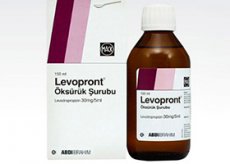Medical expert of the article
New publications
Preparations
Levopront
Last reviewed: 03.07.2025

All iLive content is medically reviewed or fact checked to ensure as much factual accuracy as possible.
We have strict sourcing guidelines and only link to reputable media sites, academic research institutions and, whenever possible, medically peer reviewed studies. Note that the numbers in parentheses ([1], [2], etc.) are clickable links to these studies.
If you feel that any of our content is inaccurate, out-of-date, or otherwise questionable, please select it and press Ctrl + Enter.

Levopront is an antitussive drug.
 [ 1 ]
[ 1 ]
Indications Levopronta
It is used to treat the symptoms of unproductive dry cough that occurs with various diseases:
- laryngitis, asthma or pharyngitis;
- bronchopneumonia, pulmonary emphysema or chronic obstructive bronchitis;
- flu, tracheobronchitis or acute tracheitis;
- diseases affecting the respiratory tract and having an infectious-inflammatory or allergic origin.
 [ 2 ]
[ 2 ]
Release form
The medicine is released in the form of syrup, in glass bottles with a capacity of 60 or 120 ml. Inside the box there is 1 such bottle, to which a measuring cup is attached.
 [ 3 ]
[ 3 ]
Pharmacodynamics
Levopront is an antitussive drug with a mainly peripheral effect. It inhibits the release of histamine with neuropeptides (substances of the P type, etc.), and at the same time reduces the frequency and severity of cough.
In addition to these properties, it also has bronchodilatory activity.
Dosing and administration
The syrup must be taken orally - for adolescents over 12 years of age and adults, the dosage is 60 mg, taken 3 times a day (6 hours between doses).
Children under 12 years of age should drink the syrup 3 times a day in a dose of 1 mg/kg.
 [ 8 ]
[ 8 ]
Use Levopronta during pregnancy
The drug should not be used during lactation or pregnancy.
Contraindications
Main contraindications:
- increased secretion of sputum;
- weakening of mucociliary activity;
- problems with the liver that are pronounced;
- the presence of intolerance to levodropropizine.
Caution is required when used in people with severe renal insufficiency. In addition, the drug is prescribed with caution to diabetics, because the syrup contains 3.5 g of sucrose.
Side effects Levopronta
Taking the syrup may lead to the development of some side effects:
- disorders affecting digestive function: vomiting, diarrhea, abdominal discomfort, nausea and heartburn;
- problems with the peripheral system and central nervous system: fainting, headaches, feeling of fatigue or drowsiness, dizziness, paresthesia and clouding of consciousness;
- manifestations from the epidermis: itching or rash;
- Disorders of the cardiovascular system: development of tachycardia.
Interactions with other drugs
The combined use of Levopront with drugs that have a sedative effect may lead to a potentiation of the depressant effect on the central nervous system.
 [ 9 ]
[ 9 ]
Storage conditions
Levopront must be stored in a place closed to children. Temperature values are standard for storing medicines.
Shelf life
Levopront can be used within 24 months from the date of manufacture of the therapeutic drug.
Attention!
To simplify the perception of information, this instruction for use of the drug "Levopront" translated and presented in a special form on the basis of the official instructions for medical use of the drug. Before use read the annotation that came directly to medicines.
Description provided for informational purposes and is not a guide to self-healing. The need for this drug, the purpose of the treatment regimen, methods and dose of the drug is determined solely by the attending physician. Self-medication is dangerous for your health.

